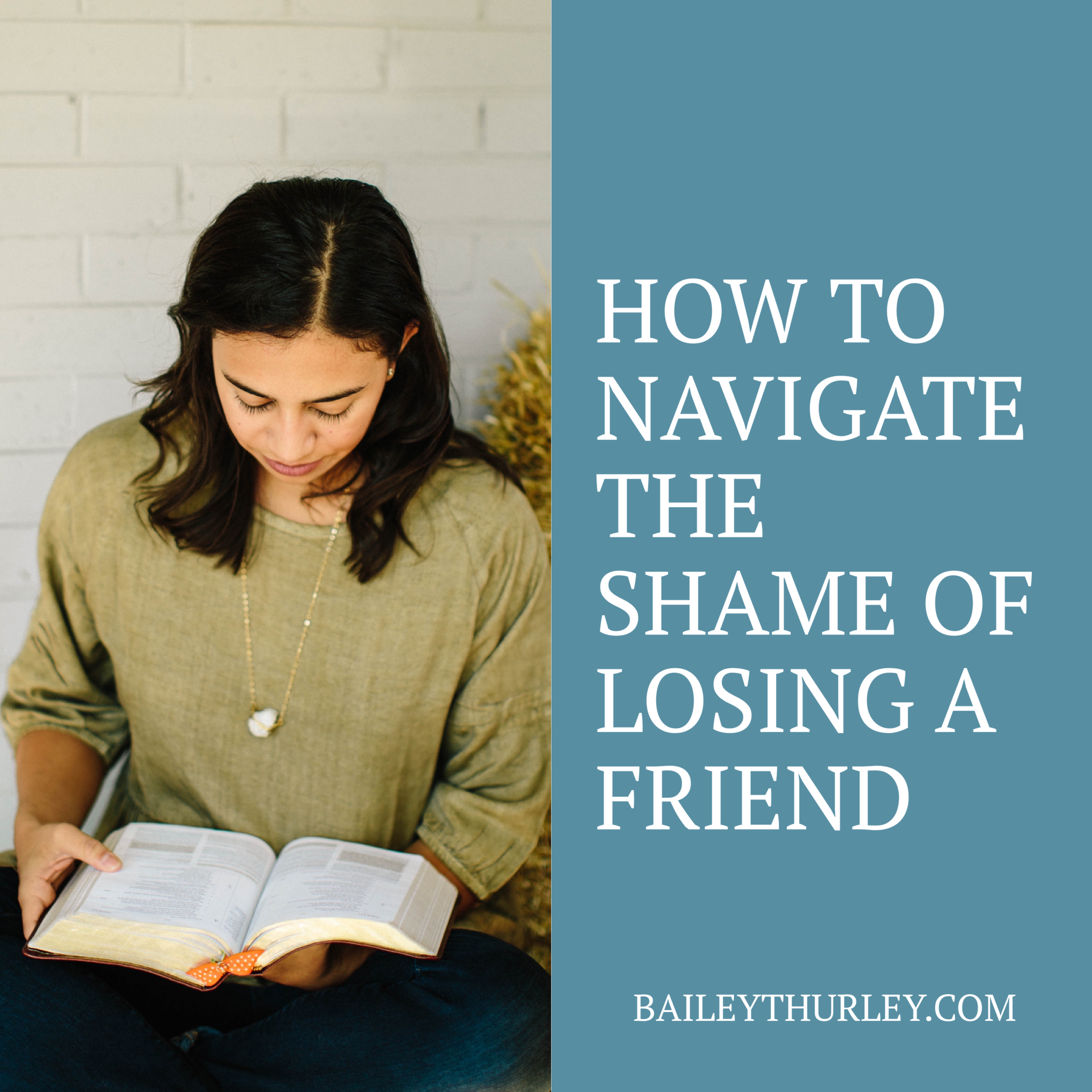Could I have done something differently?
What if I would have just kept my mouth shut and not shared my criticisms?
Did I do something wrong? Why did she just stop answering my messages?
Losing a friend, no matter the circumstance, can bring on feelings of shame. I have lost friends due to different life seasons and busy schedules, but I have also lost friends due to hurt feelings. Both situations render a level of shame that I often replay over and over again in my head.
So often, when coaching others through friendship breakups, I can easily see the solutions. But when I’m sitting with my broken relationships, there is an insurmountable hill of failure that leaves me paralyzed. I can’t seem to get over my shame or move quite as confidently toward the direction of healing and reconciliation.
Shame tells us we are the mistake, rather than looking at our role in the “breakup” as having made mistakes.
Instead of looking at the problem and identifying what went wrong and how we could learn from it; we hide under a blanket of “I am a bad friend. I am my mistakes. I am unloved. I am unwanted.”
So, when navigating shame in friend loss, we need to shift our avoidance to acceptance. We need to shift from “I was right, she was wrong” to “how can I figure out a real solution for the next time.”
Author Brene Brown gave a TEDtalk on shame where she encouraged her audience to dig into their feelings of shame—not to live there, but to understand the shame better. And from this reflection we can learn:
-humility
-how to make things right
-meet the real need
– and create a way to process this to better navigate shame in the future
My very first friendship breakup wrecked me. I cried every night for a week. Insecurity took root in all my other friendships, fearing they wouldn’t want to be my friend anymore too. There was shame in wondering if I was a horrible person and wondering if everyone saw me this way too. I consistently tried to remain “above reproach” by working through things with third party mentors and making attempts to reconcile.
Sometimes things don’t always work out like the end of a Disney movie–happy, hurt forgotten, and a concluding musical number of togetherness. So here is how I applied Brene’s helpful advice about moving away from shame to see the problem more clearly and move forward to forgive and reconcile. Let’s walk through this together.
Humility
When we step into our shame, we are asking ourselves to honestly identify where this shame is coming from. As I stepped into it, processing in prayer and with a mentor, I was allowed to approach the situation with more humility—really trying to put myself in my friend’s shoes. I wanted to understand her feelings and her point of view. I didn’t want to just assume she was wrong. So instead of making her the “bad guy,” I decided to openly ask God where I may be lacking in some of these areas of friendship. There is no shame in owning your side of the breakup.

Make It Right
When I removed myself from being the mistake and focused on the mistakes, I could better work towards reconciling. I took my personal identity and self-worth out of the equation so I could focus on offering forgiveness whether the issue was mine or hers.
Identify the Real Need
Sometimes, there is a real need not being met but it isn’t the one you are having conflict over. My friend ended the friendship over a group text miscommunication. This seems like a surface-level reason to stop being friends anymore. But there was another need not being met: her reassurance that she was included and wanted in the group. Asking clarifying questions helped get to the root of her real need.
Finding Solutions for the Future
Instead of letting shame reside, we can take each friend loss as an opportunity to find ways to do better next time. Maybe we learn to admit our faults more quickly. Maybe we learn what kind of friend we really need. Maybe we just learn that it is okay to fail sometimes as a friend but that doesn’t mean you are a bad friend. I learned all the above from this friend loss.
Friendship failure will happen, but you don’t have to run and hide when it does. Try calling out the shame for what it is and allow it to move you towards honestly and vulnerability with your friend.



I’ve often thought of this as a “friend divorce” because it is so painful and this is the very first time I have seen this addressed. Thank you for being bold enough to take on this taboo topic and address it in a helpful and healthy way.
Yeah, it is tough! It can totally feel more heartbreaking than a most of the things we lose in life. Glad this could help.